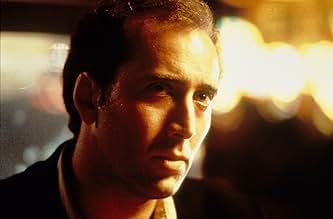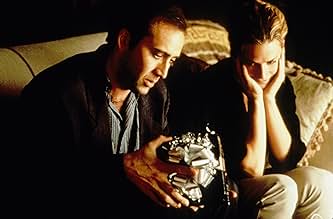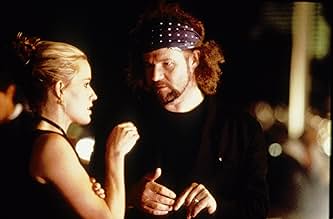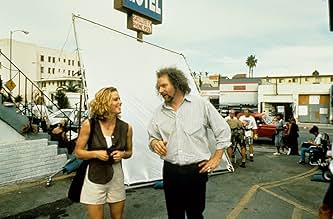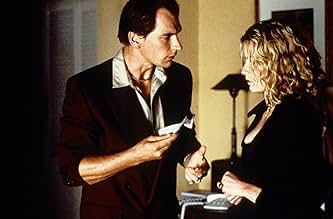हॉलीवुड के पटकथा लेखक बेन सैंडरसन, जिन्होंने अपनी शराब के कारण सब कुछ खो दिया, खुद को मौत के घाट उतारने के लिए लास वेगास पहुंचता है।हॉलीवुड के पटकथा लेखक बेन सैंडरसन, जिन्होंने अपनी शराब के कारण सब कुछ खो दिया, खुद को मौत के घाट उतारने के लिए लास वेगास पहुंचता है।हॉलीवुड के पटकथा लेखक बेन सैंडरसन, जिन्होंने अपनी शराब के कारण सब कुछ खो दिया, खुद को मौत के घाट उतारने के लिए लास वेगास पहुंचता है।
- 1 ऑस्कर जीते
- 32 जीत और कुल 30 नामांकन
Albert Henderson
- Man at Strip Bar
- (as Al Henderson)
फ़ीचर्ड समीक्षाएं
Leaving Las Vegas (1995)
**** (out of 4)
Depressing account of a man (Nicholas Cage) who goes to Las Vegas to drink himself to death and once there he strikes up a relationship with a prostitute (Elisabeth Shue). Going back and watching this film after so many years had a lot of things going through my mind. Such as the first time I watched this it was in the theater as the second part of a double feature with DEAD MAN WALKING. Talk about a depressing four hours in the theater. The second thing it reminded me of was what a terrific actor Cage was and how at the time many people were calling him one of the greatest of his generation. I bring this up considering the type of films Cage is currently doing. LEAVING LAS VEGAS is without question a very dark and depressing film and it always amuses me that people attacked the picture for this. I mean, there are several films each year that shows the fun side of drinking so I always find it strange that so many could object to a film showing the ugly side. I can understand people not wanting to sit through a nearly two-hour suicide movie but at the same time those who can stomach the story are going to be shown one of the best performances from this era. Cage is simply marvelous as the alcoholic who goes on a death wish for reasons we're not fully told. It's funny but the screenplay really doesn't give us much insight to either character other than both are troubled, alone and find some sort of comfort with each other. This love story between the two certainly isn't all that casual or romantic but it's quite unique in its own way. The way Cage controls this character, his various emotions and the physical nature of his body falling apart are simply amazing to watch. It really reminds one of how great he can be when the material is right. Shue also turns in the best performance of her career and you can really see the pain in her eyes as this man she loves is slowly dying. Julian Sands is also quite effective in his few scenes. Director Mike Figgis does an extremely good job with the material but a lot of credit also needs to go towards his film score. LEAVING LAS VEGAS isn't a very pretty movie to watch but then again, why would anyone expect alcoholism to be pretty?
**** (out of 4)
Depressing account of a man (Nicholas Cage) who goes to Las Vegas to drink himself to death and once there he strikes up a relationship with a prostitute (Elisabeth Shue). Going back and watching this film after so many years had a lot of things going through my mind. Such as the first time I watched this it was in the theater as the second part of a double feature with DEAD MAN WALKING. Talk about a depressing four hours in the theater. The second thing it reminded me of was what a terrific actor Cage was and how at the time many people were calling him one of the greatest of his generation. I bring this up considering the type of films Cage is currently doing. LEAVING LAS VEGAS is without question a very dark and depressing film and it always amuses me that people attacked the picture for this. I mean, there are several films each year that shows the fun side of drinking so I always find it strange that so many could object to a film showing the ugly side. I can understand people not wanting to sit through a nearly two-hour suicide movie but at the same time those who can stomach the story are going to be shown one of the best performances from this era. Cage is simply marvelous as the alcoholic who goes on a death wish for reasons we're not fully told. It's funny but the screenplay really doesn't give us much insight to either character other than both are troubled, alone and find some sort of comfort with each other. This love story between the two certainly isn't all that casual or romantic but it's quite unique in its own way. The way Cage controls this character, his various emotions and the physical nature of his body falling apart are simply amazing to watch. It really reminds one of how great he can be when the material is right. Shue also turns in the best performance of her career and you can really see the pain in her eyes as this man she loves is slowly dying. Julian Sands is also quite effective in his few scenes. Director Mike Figgis does an extremely good job with the material but a lot of credit also needs to go towards his film score. LEAVING LAS VEGAS isn't a very pretty movie to watch but then again, why would anyone expect alcoholism to be pretty?
Remarkable. Touching. Riveting. Leaving Las Vegas is all of these and then some. I have not seen a film of this magnitude about loneliness and acceptance in such a while that I was in tears for much of the run time.
Nicholas Cage is Ben, a man who has lost his wife and child, throws his job away, and takes all of his remaining money to buy as much liquor as possible and "drink himself to death" in the city of Las Vegas. He has given up all hope, with no wish to live, but for one reason or another, wants a companion to share in his misery, but not try to save him. He finds this companion in a hooker, Sera, played by Elizabeth Shue. They immediately form a strong relationship based on one night of talking about their lives. Sera in particular quickly grows attached to Ben, for no other reason than she has been alone her whole life and wants nothing more than to feel that want and need by someone.
Cage won his first Oscar for his role as Ben, and how deserved it was. He was astounding, perfection, down to every single tick, the volume of his voice, the pain and tragedy buried in his eyes. I could not believe the extent of his role, the dedication and time he invested in bringing this character to life. Same goes for Elizabeth Shue, who with a simple glance at a person, she reveals her entire self, and no one even dares to notice except for Ben. This neediness is apparent, she wants to hold onto this relationship so badly, yet what makes their relationship work is total and complete acceptance of their respective decisions. He will not tell her to stop being a hooker, and she in return can never ask him to stop drinking. And it is in that factor that makes this film worth watching. To be totally accepted by those around them, to open themselves up to such an extreme.
Leaving Las Vegas is a sobering film about connections, loneliness, acceptance, and a small little island of hope that is Ben and Sera. They are two good people, depicted in a world full of sorrows and misdeeds, who latch onto each other and never let go. They were nothing but ghosts, till that chance encounter, and became each others worlds. Cage and Shue bring these good people to life in such an extraordinary way, making Leaving Las Vegas a film to be treasured and remembered for years to come. I highly recommend this film.
Nicholas Cage is Ben, a man who has lost his wife and child, throws his job away, and takes all of his remaining money to buy as much liquor as possible and "drink himself to death" in the city of Las Vegas. He has given up all hope, with no wish to live, but for one reason or another, wants a companion to share in his misery, but not try to save him. He finds this companion in a hooker, Sera, played by Elizabeth Shue. They immediately form a strong relationship based on one night of talking about their lives. Sera in particular quickly grows attached to Ben, for no other reason than she has been alone her whole life and wants nothing more than to feel that want and need by someone.
Cage won his first Oscar for his role as Ben, and how deserved it was. He was astounding, perfection, down to every single tick, the volume of his voice, the pain and tragedy buried in his eyes. I could not believe the extent of his role, the dedication and time he invested in bringing this character to life. Same goes for Elizabeth Shue, who with a simple glance at a person, she reveals her entire self, and no one even dares to notice except for Ben. This neediness is apparent, she wants to hold onto this relationship so badly, yet what makes their relationship work is total and complete acceptance of their respective decisions. He will not tell her to stop being a hooker, and she in return can never ask him to stop drinking. And it is in that factor that makes this film worth watching. To be totally accepted by those around them, to open themselves up to such an extreme.
Leaving Las Vegas is a sobering film about connections, loneliness, acceptance, and a small little island of hope that is Ben and Sera. They are two good people, depicted in a world full of sorrows and misdeeds, who latch onto each other and never let go. They were nothing but ghosts, till that chance encounter, and became each others worlds. Cage and Shue bring these good people to life in such an extraordinary way, making Leaving Las Vegas a film to be treasured and remembered for years to come. I highly recommend this film.
Not unlike John Huston's Under The Volcano, Leaving Las Vegas borrows from Greek mythology, obliquely mirroring the tragedy and pathos of Orpheus' failed attempt to rescue his dead wife, Eurydice, from Hades. Mike Figgis obliges us with a helpful hint in the scene where Nicolas Cage gives Elizabeth Shue a present of earrings: Greek cameos.
As in the ancient tale, love challenges the inevitability of death, although, in the case of LLV, roles are upended and sometimes blurred, and Orphean references are either thinly disguised, or non-specific to the point of being thoroughly sublimated. Academic, to be sure, but completely acceptable as long as LLV can sustain itself and remain engaging. And it surely does, thanks to Figgis' intelligent script and direction, Cage's role as a down-and-out writer and his protracted self-destruction, and Shue's portrayal of a lonely hooker, lifting that old bromide beyond what could have been routine, to a level not seen since Jane Fonda's character in Klute. Excellent performances all around.
With all that said, this film is not for everyone (in particular those who only respond to gratuitous sex, car chases, and mindless pyrotechnics). The lurid depictions of despair, self-loathing, and violence could put off even the most hardened social worker. In my mind's eye, I could see psychiatrists amongst the theater audiences, furiously jotting down their observations. Understandable; the two principal characters are, in the common parlance, screwed up. One cannot cope with failure, so decides to opt out, while the other does cope, but only barely, existing along the ragged edges of what passes for society in Nevada Hell. These details, though, tend to outline and, indeed, strengthen the true heart of this film: Sacrifice and Unconditional Love.
If this film is not for everyone, then who is it for? Those with real life experience and the maturity gained thereby. Those with strong emotional constitutions. Anyone appreciative of impassioned performances. Freudians. Alcoholics, recovering and otherwise. Pimps. Priests. Classicists. Petty whiners in need of perspective. And, more than anyone else, couples who plan on breaking up. In sickness and in health, 'til death do us part. 9.5 out of 10.
As in the ancient tale, love challenges the inevitability of death, although, in the case of LLV, roles are upended and sometimes blurred, and Orphean references are either thinly disguised, or non-specific to the point of being thoroughly sublimated. Academic, to be sure, but completely acceptable as long as LLV can sustain itself and remain engaging. And it surely does, thanks to Figgis' intelligent script and direction, Cage's role as a down-and-out writer and his protracted self-destruction, and Shue's portrayal of a lonely hooker, lifting that old bromide beyond what could have been routine, to a level not seen since Jane Fonda's character in Klute. Excellent performances all around.
With all that said, this film is not for everyone (in particular those who only respond to gratuitous sex, car chases, and mindless pyrotechnics). The lurid depictions of despair, self-loathing, and violence could put off even the most hardened social worker. In my mind's eye, I could see psychiatrists amongst the theater audiences, furiously jotting down their observations. Understandable; the two principal characters are, in the common parlance, screwed up. One cannot cope with failure, so decides to opt out, while the other does cope, but only barely, existing along the ragged edges of what passes for society in Nevada Hell. These details, though, tend to outline and, indeed, strengthen the true heart of this film: Sacrifice and Unconditional Love.
If this film is not for everyone, then who is it for? Those with real life experience and the maturity gained thereby. Those with strong emotional constitutions. Anyone appreciative of impassioned performances. Freudians. Alcoholics, recovering and otherwise. Pimps. Priests. Classicists. Petty whiners in need of perspective. And, more than anyone else, couples who plan on breaking up. In sickness and in health, 'til death do us part. 9.5 out of 10.
Having recovered from the mind-numbing Heat, a supposed character study, I was eager to sink my teeth into a different 1995 gem and I found it here with Leaving Las Vegas. With only two important characters, the entire film rests heavily on the shoulders of Nicolas Cage and Elisabeth Shue, and neither of them disappoint.
Of the two, Nicolas Cage is the Oscar winner and the truly deserving one at that. He is simply hypnotic as Ben Sanderson, an alcoholic so far gone he doesn't even remember why he wants to die. His withdrawal scenes are so real they are upsetting, whereas his drunken charisma is so real its almost funny. The balance that Cage strikes really highlights how tragic his character really is. He conveys hatred and rage and loneliness and despair, and you will be so sad yet so hooked that its impossible to look away. Elisabeth Shue gets off to a slower start than Cage, but she is still an endearing, emotional character, capable of great things.
The writing is very good, giving Cage the perfect, pitiful dialogue in order to serve his woeful character, and even throws in a hypnotic monologue or two. The best thing that Figgis achieves in this film is his cruel and deliberate intersplicing of mood-killing incidents (invariably caused by alcohol) between the moments of love and passion that Shue and Cage share. It is a relentless reminder that their love story is completely doomed. Sting's My One and Only Love is all over this film, which I thought was a very good choice, in addition to the beautiful and haunting score.
The final act focuses a little too much on Shue and not enough on Cage, and whilst their final scene together was appropriately pathetic to suit the tragedy of the film, I couldn't help but feel less engaged. I also didn't enjoy Shue's constant commentary, given that it doesn't really go anywhere.
But between the raw passion of Nicholas Cage and the uncompromising guiding hand of Mike Figgis, any complaints I could ever have otherwise found in Leaving Las Vegas are completely washed away.
Of the two, Nicolas Cage is the Oscar winner and the truly deserving one at that. He is simply hypnotic as Ben Sanderson, an alcoholic so far gone he doesn't even remember why he wants to die. His withdrawal scenes are so real they are upsetting, whereas his drunken charisma is so real its almost funny. The balance that Cage strikes really highlights how tragic his character really is. He conveys hatred and rage and loneliness and despair, and you will be so sad yet so hooked that its impossible to look away. Elisabeth Shue gets off to a slower start than Cage, but she is still an endearing, emotional character, capable of great things.
The writing is very good, giving Cage the perfect, pitiful dialogue in order to serve his woeful character, and even throws in a hypnotic monologue or two. The best thing that Figgis achieves in this film is his cruel and deliberate intersplicing of mood-killing incidents (invariably caused by alcohol) between the moments of love and passion that Shue and Cage share. It is a relentless reminder that their love story is completely doomed. Sting's My One and Only Love is all over this film, which I thought was a very good choice, in addition to the beautiful and haunting score.
The final act focuses a little too much on Shue and not enough on Cage, and whilst their final scene together was appropriately pathetic to suit the tragedy of the film, I couldn't help but feel less engaged. I also didn't enjoy Shue's constant commentary, given that it doesn't really go anywhere.
But between the raw passion of Nicholas Cage and the uncompromising guiding hand of Mike Figgis, any complaints I could ever have otherwise found in Leaving Las Vegas are completely washed away.
It's not a movie I could bear to watch very often, because it's sad to see people destroy themselves. But Nicolas Cage and Elisabeth Shue are riveting to watch here. As a person who has a past involvement in alcohol and substance abuse, I found Cage's performance especially compelling, and after watching him in this one, I am sure glad that lifestyle is behind me!
The chemistry between these two is really great, two people that need each other in different ways, trying to cope with how screwed up their lives have become. Very real performances, if you're faint-of-heart be ready for some strong words, and not just obscenities. Wow! They really lay it on the line. Great performances by two of my favorites.
The chemistry between these two is really great, two people that need each other in different ways, trying to cope with how screwed up their lives have become. Very real performances, if you're faint-of-heart be ready for some strong words, and not just obscenities. Wow! They really lay it on the line. Great performances by two of my favorites.
क्या आपको पता है
- ट्रिवियाAuthor John O'Brien, on whose novel this movie is based, committed suicide two weeks after the movie went into production. Director Mike Figgis contemplated abandoning the project, but decided the film would make a good memorial for O'Brien.
- गूफ़Yuri is supposed to be swearing in Latvian on the phone. In fact, he speaks gibberish.
- भाव
Ben Sanderson: I don't know if I started drinking 'cause my wife left me or my wife left me 'cause I started drinking, but fuck it anyway.
- क्रेज़ी क्रेडिटThe opening credits do not appear until fifteen minutes into the film.
- इसके अलावा अन्य वर्जनLaserDisc version is unrated and contains more sexually explicit footage. First pressings of the VHS versions also contained this footage but later pressings did not. The Unrated Edition has also been released on DVD and Blu-ray and runs 112 min.
टॉप पसंद
रेटिंग देने के लिए साइन-इन करें और वैयक्तिकृत सुझावों के लिए वॉचलिस्ट करें
विवरण
- रिलीज़ की तारीख़
- कंट्री ऑफ़ ओरिजिन
- आधिकारिक साइट
- भाषाएं
- इस रूप में भी जाना जाता है
- Adiós a Las Vegas
- फ़िल्माने की जगहें
- River Palms Resort Casino - 2700 South Casino Drive, Laughlin, नेवादा, यूएसए(interiors, as Gold River Casino and Resort)
- उत्पादन कंपनियां
- IMDbPro पर और कंपनी क्रेडिट देखें
बॉक्स ऑफ़िस
- बजट
- $36,00,000(अनुमानित)
- US और कनाडा में सकल
- $3,20,29,928
- US और कनाडा में पहले सप्ताह में कुल कमाई
- $70,864
- 29 अक्टू॰ 1995
- दुनिया भर में सकल
- $3,20,29,928
- चलने की अवधि
- 1 घं 51 मि(111 min)
- रंग
- ध्वनि मिश्रण
- पक्ष अनुपात
- 1.66 : 1
इस पेज में योगदान दें
किसी बदलाव का सुझाव दें या अनुपलब्ध कॉन्टेंट जोड़ें


